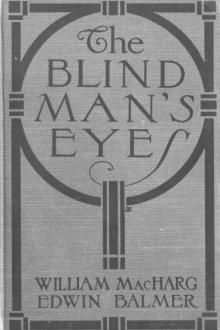The Blind Man's Eyes by William MacHarg (best books to read non fiction txt) 📕

- Author: William MacHarg
- Performer: -
Book online «The Blind Man's Eyes by William MacHarg (best books to read non fiction txt) 📕». Author William MacHarg
Project Gutenberg's The Blind Man's Eyes, by William MacHarg and Edwin Balmer
This eBook is for the use of anyone anywhere at no cost and with
almost no restrictions whatsoever. You may copy it, give it away or
re-use it under the terms of the Project Gutenberg License included
with this eBook or online at www.gutenberg.net
Title: The Blind Man's Eyes
Author: William MacHarg
Edwin Balmer
Illustrator: Wilson C. Dexter
Release Date: July 3, 2010 [EBook #33064]
Language: English
*** START OF THIS PROJECT GUTENBERG EBOOK THE BLIND MAN'S EYES ***
Produced by Al Haines
By WILSON C. DEXTER
Publishers —— New York
BY LITTLE, BROWN, AND COMPANY
All rights reserved
R. G.
Gabriel Warden—capitalist, railroad director, owner of mines and timber lands, at twenty a cow-puncher, at forty-eight one of the predominant men of the Northwest Coast—paced with quick, uneven steps the great wicker-furnished living room of his home just above Seattle on Puget Sound. Twice within ten minutes he had used the telephone in the hall to ask the same question and, apparently to receive the same reply—that the train from Vancouver, for which he had inquired, had come in and that the passengers had left the station.
It was not like Gabriel Warden to show nervousness of any sort; Kondo, the Japanese doorman, who therefore had found something strange in this telephoning, watched him through the portières which shut off the living-room from the hall. Three times Kondo saw him—big, uncouth in the careless fit of his clothes, powerful and impressive in his strength of feature and the carriage of his well-shaped head—go to the window and, watch in hand, stand staring out. It was a Sunday evening toward the end of February—cold, cloudy and with a chill wind driving over the city and across the Sound. Warden evidently saw no one as he gazed out into the murk; but each moment, Kondo observed, his nervousness increased. He turned suddenly and pressed the bell to call a servant. Kondo, retreating silently down the hall, advanced again and entered the room; he noticed then that Warden's hand, which was still holding the watch before him, was shaking.
"A young man who may, or may not, give a name, will ask for me in a few moments. He will say he called by appointment. Take him at once to my smoking-room, and I will see him there. I am going to Mrs. Warden's room now."
He went up the stairs, Kondo noticed, still absently holding his watch in his hand.
Warden controlled his nervousness before entering his wife's room,—where she had just finished dressing to go out,—so that she did not at first sense anything unusual. In fact, she talked with him casually for a moment or so before she even sent away her maid. He had promised a few days before to accompany her to a concert; she thought he had come simply to beg off. When they were alone, she suddenly saw that he had come to her to discuss some serious subject.
"Cora," he said, when he had closed the door after the maid, "I want your advice on a business question."
"A business question!" She was greatly surprised. She was a number of years younger than he; he was one of those men who believe all business matters should be kept from their wives.
"I mean it came to me through some business—discoveries."
"And you cannot decide it for yourself?"
"I had decided it." He looked again at his watch. "I had quite decided it; but now—It may lead to some result which I have suddenly felt that I haven't the right to decide entirely for myself."
Warden's wife for the first time felt alarmed. She could not well describe his manner; it did not suggest fear for himself; she could not imagine his feeling such fear; but she was frightened. She put her hand on his arm.
"You mean it affects me directly?"
"It may. For that reason I feel I must do what you would have me do."
He seized both her hands in his and held her before him; she waited for him to go on.
"Cora," he said, "what would you have me do if you knew I had found out that a young man—a man who, four or five years ago, had as much to live for as any man might—had been outraged in every right by men who are my friends? Would you have me fight the outfit for him? Or would you have me—lie down?"
His fingers almost crushed hers in his excitement. She stared at him with only pride then; she was proud of his strength, of his ability to fight, of the power she knew he possessed to force his way against opposition. "Why, you would fight them!"
"You mean you want me to?"
"Isn't that what you had decided to do?"
He only repeated. "You want me to fight them?"
"Of course."
"No matter what it costs?"
She realized then that what he was facing was very grave.
"Cora," he said, "I didn't come to ask your advice without putting this squarely to you. If I go into this fight, I shall be not only an opponent to some of my present friends; I shall be a threat to them—something they may think it necessary to remove."
"Remove?"
"Such things have happened—to better men than I, over smaller matters."
She cried out. "You mean some one might kill you?"
"Should that keep me from going in?"
She hesitated. He went on: "Would you have me afraid to do a thing that ought to be done, Cora?"
"No," she said; "I would not."
"All right, then. That's all I had to know now. The young man is coming to see me to-night, Cora. Probably he's downstairs. I'll tell you all I can after I've talked with him."
Warden's wife tried to hold him a moment more, but he loosed himself from her and left her.
He went directly downstairs; as he passed through the hall, the telephone bell rang. Warden himself answered it. Kondo, who from his place in the hall overheard Warden's end of the conversation, made out only that the person at the other end of the line appeared to be a friend, or at least an acquaintance, of Warden's. Kondo judged this from the tone of the conversation; Warden spoke no names. Apparently the other person wished to see Warden at once. Warden finished, "All right; I'll come and get you. Wait for me there." Then he hung up.
Turning to Kondo, he ordered his limousine car. Kondo transmitted the order and brought Warden's coat and cap; then Kondo opened the house door for him and the door of the limousine, which had been brought under the porte-cochère. Kondo heard Warden direct the chauffeur to a drug store near the center of the city; the chauffeur was Patrick Corboy, a young Irishman who had been in Warden's employ for more than five years; his faithfulness to Warden was never questioned. Corboy drove to the place Warden had directed. As they stopped, a young man of less than medium height, broad-shouldered and wearing a mackintosh, came to the curb and spoke to Warden. Corboy did not hear the name, but Warden immediately asked the man into the car; he directed Corboy to return home. The chauffeur did this, but was obliged on the way to come to a complete stop several times, as he met streetcars or other vehicles on intersecting streets.
Almost immediately after Warden had left the house, the door-bell rang and Kondo answered it. A young man with a quiet and pleasant bearing inquired for Mr. Warden and said he came by appointment. Kondo ushered him into the smoking room, where the stranger waited. The Jap did not announce this arrival to any one, for he had already received his instructions; but several times in the next half hour he looked in upon him. The stranger was always sitting where he had seated himself when Kondo showed him in; he was merely waiting. In about forty minutes, Corboy drove the car under the porte-cochère again and got down and opened the door. Kondo had not heard the car at once, and the chauffeur had not waited for him. There was no motion inside the limousine. The chauffeur looked in and saw Mr. Warden lying back quietly against the cushions in the back of the seat; he was alone.
Corboy noticed then that the curtains all about had been pulled down; he touched the button and turned on the light at the top of the car, and then he saw that Warden was dead; his cap was off, and the top of his head had been smashed in by a heavy blow.
The chauffeur drew back, gasping; Kondo, behind him on the steps, cried out and ran into the house calling for help. Two other servants and Mrs. Warden, who had remained nervously in her room, ran down. The stranger who had been waiting, now seen for the first time by Mrs. Warden, came out from the smoking room to help them. He aided in taking the body from the car and helped to carry it into the living room and lay it on a couch; he remained until it was certain that Warden had been killed and nothing could be done. When this had been established and further confirmed by the doctor who was called, Kondo and Mrs. Warden looked around for the young man—but he was no longer there.
The news of the murder brought extras out upon the streets of Seattle, Tacoma, and Portland at ten o'clock that night; the news took the first page in San Francisco, Chicago, and New York papers, in competition with the war news, the next morning. Seattle, stirred at once at the murder of one of its most prominent citizens, stirred still further at the new proof that Warden had been a power in business and finance; then, as the second day's dispatches from the larger cities came in, it stirred a third time at the realization—for so men said—that this was the second time such a murder had happened.
Warden had been what





Comments (0)